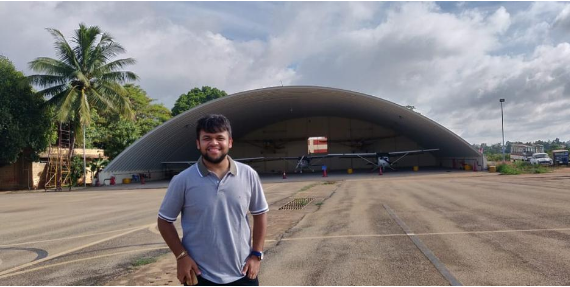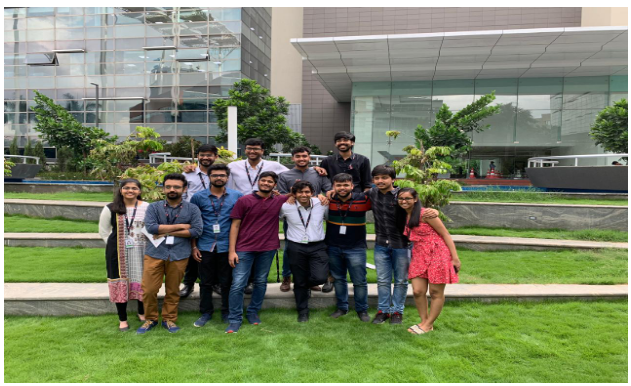

Body of IITR

‘Getting a good internship is not the end. It is not even the beginning of the end. But it is, perhaps, the end of the beginning’
– My own version of Churchill’s saying aptly describes the approach everyone should keep in their mind while applying for internships in their career. I would be sharing the story of my internship, how I prepared, tried, failed, and finally got selected for HSBC as well as Mitacs Research Internship.
Before I begin, I would like to explicitly advise readers to take this as a source of motivation and use their individualistic approach for getting an internship. There is no predefined recipe for success and your hard work and skill-set is the only thing that is going to always stand by you. There are people who are good with technical knowledge, and some who are good at the ‘Indian Jugaad’, but the people who find a balance between the two are the ones who lead the race.
At the beginning of my penultimate year, my profile was Techno-managerial one. Technical - because I had worked on a diverse range of technical projects, did a research internship in SPARK, got an offer of a research internship in CFD from ETH Zurich and managerial because I was a part of the students’ body of Tinkering Lab, member of the Organising Committee of Thomso and several other projects.
With these things in my portfolio, I was more inclined towards getting a Research Internship with DAAD or Mitacs. So, I started writing to a few German Professors, which is the preliminary step in applying for a DAAD Internship. For people interested in DAAD and Mitacs, my two cents would be to start applying as early as you can. It certainly gives a boost to your application because finding the right project under the right professor is one of the hurdles you are bound to cross. I started writing to professors by the end of July’18 and fortunately, got a reply from TU Berlin. For the e-mail part, make sure that your cover letter is unique and not copied directly from ‘Google baba’. Moreover, keep your research interests well aligned with those of the host professor. There is a lot of fish in the sea but only the golden one attracts the attention of the beholder and your cover letter certainly provides the required glitter in your application.
The Internship season started as soon as we came back to Roorkee in July’18. Swayed by the charm of those high stipend notices, I also applied to giant coding firms and banks— Goldman Sachs, ITC, Nutanix, but couldn’t get through. I was disheartened, for a moment, but had a firm belief that my hard work won’t go vain. A point worth keeping in mind is that one should always learn from their failures. Learn to figure out what went wrong during an interview or where exactly were you lacking in knowledge. What measures should be taken so that you don’t repeat those mistakes?
In the job description of HSBC, they needed students with excellent analytical skills, strong mathematical background (Probability & Statistics), and necessary programming skills (C++ or Python). These topics are vast, and you can never be 100% confident that you’ll be able to dodge every question that the interviewer shoots at you. It’s not unusual to have lows during such time, but working and learning constantly is definitely going to pull you through. For every sun that sets, there is a sun that rises. For Probability, I solved problems from Michael Baron and did a course of statistics from Coursera. For C++, I solved questions of InterviewBit and Geeks for Geeks. I revised the Numerical Methods course. N.M is one of my all-time favourite courses, and I’d advise all of you to review its notes for quant-based company interviews. Lastly, you should be thorough with every word you mention in your resume. Be it internships, projects or PORs. The interviewer will try to grill you on prospects of the work you have achieved in your internships or your projects to get an idea whether you actually worked on those or mentioned them just to fill up your resume.
First-round was Resume-shortlisting, and when the list came out, I was delighted to see my name on the top. I believe they give equal weightage to your projects and internships and are looking for a mathematical and analytical mind. The second round was a technical one. It went on for about 50 minutes. They asked me questions regarding my internships, projects general problems on probability, puzzles, market opportunity questions, guesstimation and Complex Integration. They try to check how you hold up under stress, so try to be calm and give your best. Ten students were shortlisted after this round. Third-round was based on coding. They asked me about problems related to Data Structures and Algorithms. All they were concerned about was the approach you use in solving those problems. For an in-view, I would advise you to be loud and clear about whatever you are thinking. Let the interviewer experience the journey you took to reach the end of the problem from ground zero. This way, even if you get stuck somewhere, the interviewer can help you by pointing in the right direction. The fourth round was HR. Common HR-based questions like “Why do you want to join HSBC?”, “Why should we hire you?”, “What differentiates you from other students?” “What are your Future Goals?” etc were the show stoppers. Be honest and try to have sample answers ready since mostly, the intent of HR questions of every company remains the same— they want to see your dedication to work and honest attitude while answering and obviously, excellent communication skills. Finally, three students were selected, and we were all given a ‘chapo’ at the Rustic House.
“HSBC is a dream company for all those who want to pursue a career in quantitative research”. Before going there, this was only a statement for me, but now, after completing the internship there, I can say this is the reality. In India, there are not many firms which can provide the opportunities that HSBC is offering. Initially, we were given a training programme of 7 days, which taught us different Financial terms and Asset Classes. Senior leaders of HSBC GBM gave all the lectures. It was a great learning experience, and we enjoyed the sessions. A sum total of 14 Interns from Top 6 IITs were selected and all were given independent projects to work upon, which were challenging and required an in-depth knowledge of Finance, Coding and Quantitative skills. All the projects were real-life live problems which needed to be solved in order to optimize Pricing algorithms and strategies enforced by the bank. Different interns were allocated different asset classes, which broadly can be classified into 3 types: Equities, Fixed Income (FI), and Foreign Exchange (FX). I was assigned a project from the London office and had a team of E-Risk Spot Foreign Exchange. To give you a general idea, FX E-Risk Foreign Exchange team of HSBC deals with electronic hedging of foreign exchange currency pairs and provides insights to Quant Traders like MTM PNLs, strategies caveats, pricing analytics etc. My project was a research-based one in which I needed to devise a Technical Indicator first and then code it in Python. So, It was a mixture of Finance, Coding and Quant. I can’t disclose details regarding the project because of the compliance issues of HSBC, but it was an interesting project and I learnt immensely.
One of the best things about HSBC is that people there are very approachable. You can talk to the Senior Most Management whenever you feel like and they have a pool of knowledge with a work experience of about 20 years. As my project was a complex one, I took guidance and help from my mentor, Pratyush and his whole team. All of them were ready to help whenever I faced a problem. In finance firms, there are times when you have to give in 12+ hours of work, but in HSBC there was never a compulsion from anyone in the team. People working for such long durations without fatigue shows the dedication that the HSBC team works with. Working hours were flexible, but we were expected to wear formals from Mon-Thu. For Friday, casuals were allowed. There was a big cafeteria and a co-working space in which you could relax. HSBC provides for one of the best learning platforms and culture, which anyone interested in finance can think of.

The application forms for MITACS Internship are to be filled by September, generally. I had filled the form much before the application deadline, and also before HSBC came for an internship. A month after the results of HSBC came, I was selected for the Mitacs Research Internship at the University of Toronto. I consulted my seniors, parents and well-wishers to decide which path to choose. Since I already had research intern experience from sophomore year, I decided to gain corporate exposure in Finance so finally resolved the dilemma and chose HSBC for the summers.
Points to be noted for MITACS: Take your time to fill out the application form. The timeline provided by MITACS is broad enough to get your application reviewed by seniors/mentors in the field. Get in touch with the seniors who were selected in Mitacs and learn from their experiences. You will get a general idea of what the Canadian professors expect you to write in it.
Interning at HSBC was once in a lifetime experience for me. We played various sports with our co-interns as well as the team during weekends. Bangalore is a city, which I feel is ideal for enjoyment. I went to almost every club in Bangalore. We even planned a trip to Ooty, which is like heaven on earth. On a finishing note, I can say that I made friends and memories for life.
As I said in the beginning, you should take an internship as only the end of the beginning. Fight for it but never feel disheartened by the course of rejections which will come in your path because after all these failures, hard work will surely pay off and you will come out with flying colours.
All the very best.